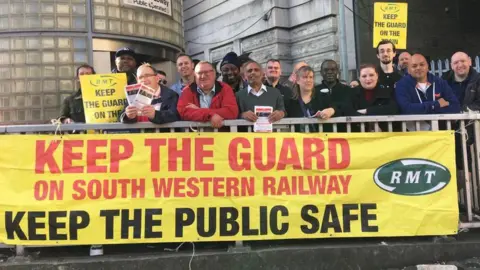South Western Railway workers begin five-day strike
 Samuel Gould/LBC
Samuel Gould/LBCThousands of commuters faced disruption on the first of a five-day strike by South Western Railway (SWR) staff over the role of train guards.
Members of the Rail, Maritime and Transport union (RMT) said the walkout which began at 00:01 BST had "solid support".
Stations and platforms across the network were packed with commuters struggling to get to and from work.
SWR said a reduced service is running across the network.
The operator which runs services in London and Berkshire, Surrey, Hampshire, Dorset, Devon, the Isle of Wight and Somerset, said the action was "unnecessary" and it was "cynical" of the union to target events such as Royal Ascot.
It said extra early-evening trains were running between London Waterloo and Reading to help people leaving the racing festival.
Earlier, hundreds of people queued down the street in Surbiton, south west London, as they waited for trains.
'Tempers fraying'
Passengers took to social media to vent their frustration, including Ajay Arora who tweeted: "Amazing start of the day with epic chaos at #SurbitonStation."
Mark Kanes said on Twitter that "tempers [were] fraying" on his train at Woking, with "people being left behind".
BBC reporter Tarah Welsh filmed a queue of passengers snaking down the street outside Surbiton station.
Allow X content?
- Has your journey been affected? Email [email protected]
Adam Neal-Jones described the scenes at Surbiton as "utter madness". At 08:45 he said he had been told the earliest he could expect to board a train was 11:00.
Francesca Gillett said the situation at the station was a "total mess", with a "mile-long" queue that was not moving.
Another commuter, Abigail Barletta, said she had managed to get to work, but was nearly an hour late after a "journey from hell" on a "hot and crowded" train.
SWR said it would look to increase services stopping at Surbiton over the period of the strike.
A spokesperson said: "While we are doing all we can to keep passengers moving during this unnecessary industrial action, Surbiton station is one of our busiest stations and we need to keep passengers safe by controlling access to the platforms.
"Passengers are strongly advised to avoid busy peak periods and travel on earlier or later trains because of the reduction in services at key stations like Surbiton."
Allow X content?
RMT said staff had been left with no choice but to strike, and accused SWR of failing to guarantee guard roles.
The long-running dispute has resulted in 29 days of industrial action by RMT members over the past two years.
A planned walkout in February was suspended after the RMT said there had been "substantial progress" in talks with the company.
This followed the suspension of strikes on Northern Rail after the company agreed to guarantee a conductor on all trains.
However, RMT said SWR had now "rowed back" and was refusing to rule out future driver-controlled operations.
The union said this would see the role of guards "carved up completely".
 @notdaftcarol
@notdaftcarol Tom Seldon
Tom SeldonRMT general secretary Mick Cash said the company had "dragged their heels and failed to bolt down an agreement that matches up to our expectations on the guard guarantee".
"The company has refused to give assurances on the future operational role of the guard, fuelling fears amongst our members of a stitch-up," he said.
SWR said the company met union representatives last week to arrange fresh talks but the union was "insistent on going ahead" with the action.
It said it had matched RMT's request to keep a guard on each train and wanted to move on to discuss how to make the most of new technology on board.
 Jade Tilling
Jade Tilling Michael Ryan
Michael RyanAn SWR spokesman said the company "remains committed to finding a solution".
Passengers heading to events at Twickenham, Hampton Court and Royal Ascot have been advised to allow extra time for their travel.
The action is scheduled to end at 23:59 on Saturday.
 RMT
RMT
Analysis
By Paul Clifton, BBC South transport correspondent
When the union halted strikes in February, it seemed a deal was possible. It didn't happen. After a four-month respite for passengers, the strikes are back on.
By striking during Royal Ascot, one of the region's biggest sporting events, the RMT wants the disruption to be substantial.
The union thinks this will force management towards a deal. The company does not see it that way. And it says one in three RMT guards on rota today actually turned up for work.
The company says it will roster a guard on every train. But it will not promise what the union wants - that it will never, under any circumstances, run a train without a guard.
Many people would characterise that as old working practices versus new technology. The union says it is about safety.
So far as I can tell, absolutely nothing has moved on since the first strike back in November 2017.

Has your journey been affected? Email [email protected]
Please include a contact number if you are willing to speak to a BBC journalist. You can also contact us in the following ways:
- WhatsApp: +44 7555 173285
- Tweet: @BBC_HaveYourSay
- Send pictures/video to [email protected]
- Upload your pictures / video here
- Text an SMS or MMS to 61124 or +44 7624 800 100
- Please read our terms of use and privacy policy
